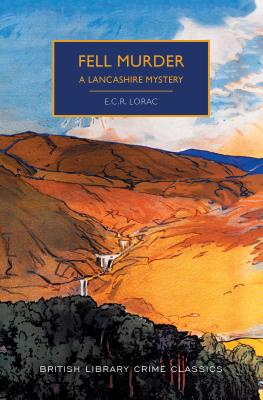 Fell Murder by E.C.R. Lorac
Fell Murder by E.C.R. Lorac Series: Robert MacDonald #23
Published by Poisoned Pen Press on January 6, 2020 (first published 1944)
Source: NetGalley
Genres: Vintage Mystery
Pages: 240
Format: eBook
Purchase at Bookshop.org
Add on Goodreads

'...this crime is conditioned by the place. To understand the one you've got to study the other.'
The Garths had farmed their fertile acres for generations, and fine land it was with the towering hills of the Lake Country on the far horizon. Here hot-tempered Robert Garth, still hale and hearty at eighty-two, ruled Garthmere Hall with a rod of iron. Until, that is, old Garth was found dead–'dead as mutton'–in the trampled mud of the ancient outhouse.
Glowering clouds gather over the dramatic dales and fells as seasoned investigator Chief Inspector Macdonald arrives in the north country. Awaiting him are the reticent Garths and their guarded neighbours of the Lune Valley; and a battle of wits to unearth their murderous secrets.
First published in 1944, Fell Murder is a tightly-paced mystery with authentic depictions of its breathtaking locales and Second World War setting.
In Fell Murder, Lorac does a great job setting the scene. Before the murder even happens, we know the family and their quarrels, the neighboring farmers and the landscape well. For some, the prolonged introduction may make the book seem to start off slow, but I like getting to know the eventual suspects and seeing how they interacted with the victim when he was alive.
Garth was a respected, rather than loved, elderly and wealthy landowner. Even though he was tough and mean, he was a hard-worker and dealt with people fairly for the most part. Nevertheless, there are plenty of suspects among the family and neighbors. MacDonald, our series detective, is called in from Scotland Yard because the local man is too busy and not used to dealing with murders, and it’s for the best. The local man is a townie and treats the farmers as if they’re stupid. MacDonald is gentler and realizes their slowness in speech and action has nothing to do with intelligence. The locals think about what to say, will not jump to accuse anyone. They’re stubborn and distrustful of outsiders, but they’re hard-working and honest and MacDonald treats them with respect.
The mystery was well-done. The clues were there, but I only saw them in hindsight. It wouldn’t have been hard to guess who the killer was though.
This is the third in the series I’ve read—they’re of course being reprinted out of order—and probably my favorite so far. The landscape and characters do outshine the mystery, but sometimes that’s just fine.
I love it when the clues are there but I miss them. I know that’s the opposite of other people but it makes it feel like a well constructed mystery to me.
Exactly. I don’t want to be able to guess who the killer is, but I want the mystery to be fair.
New one to me! Good find!
I’ve read three in the series and enjoyed them. And they don’t ignore the war as much as some other mysteries of the era do.
I hardly ever guess who the killer is but that’s fine with me. Back ground and description definitely will add interest. I like the slower pace of those classic crime writers myself.
I actually don’t often try to guess, but sometimes authors just about hit you over the head with it.